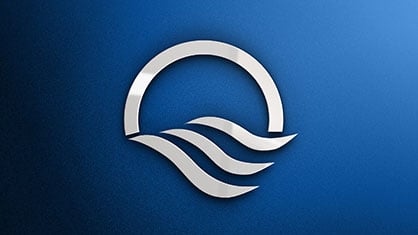Trusted by franchise owners nationwide.
Get the capital you need to open your doors — supported by a bank that knows franchising inside and out.
Top 5 SBA franchise loan lender*
+350 different franchise concepts
+$600 million franchise loans funded
Getting franchise funding shouldn’t be confusing, slow or full of red tape.
Get the capital you need in 3 simple steps.
Step 1 - See if Your Pre-Qualify
Tell us your goals. Buying, expanding, or starting a franchise. Our quick form matches you with the right specialist.
✔ No credit check
✔ Fast and simple
Step 2 - Get Expert Guidance
Talk one-on-one with a franchise loan expert. Review your readiness and map out a plan that works for you.
✔ Personal, pressure-free advice
✔ Clear next steps
Step 3 - Take the Next Step
Move your franchise plans forward with expert support. We’ll help gather documents, organize your application, and guide you through the process.
✔ Guidance every step of the way
✔ Clear next steps so you always know where you stand
Real franchise owners. Real results. See how First Bank of the Lake helped turn their business dreams into reality.
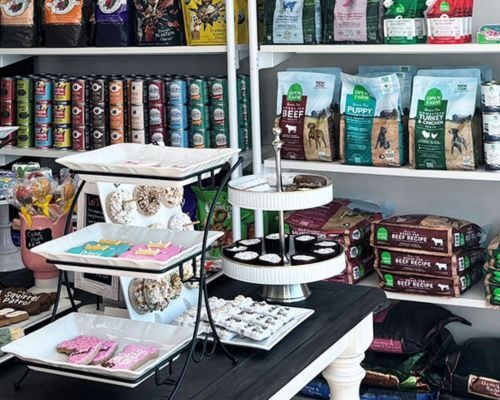
Woof Gang Bakery
After years in HR, Kasia followed her passion for animals and, with a $345K SBA loan from First Bank of the Lake, quickly launched her Woof Gang Bakery & Grooming franchise — already nearing breakeven just months in.
Read More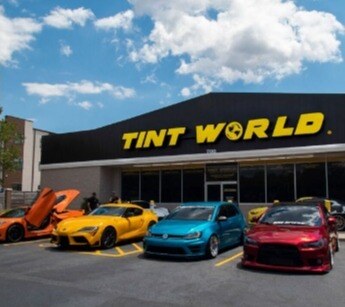
Tint World
After losing his wife, a friend, and his life savings, Dan Billings reinvented his life with a Tint World franchise — and with guidance and an SBA loan from First Bank of the Lake, his business is thriving and he’s already eyeing a second location.
Read More
Lifetime Green Coatings
Father and son duo Barry and Parker Norfleet launched six Lifetime Green Coatings franchises with a $400K SBA loan from First Bank of the Lake — quickly setting up operations and nearly breaking even within just three months.
Read MoreProven results backed by industry leading expertise
At First Bank of the Lake, our experienced banking team combines deep industry knowledge with a commitment to first-class service and trusted advice. We understand growing businesses and provide tailored solutions — including government-backed SBA 7(a) and 504 loans — to help entrepreneurs thrive and expand, even when conventional financing isn’t an option.
+$600M
In franchise loans since 2020
+$1.9 Billon
In SBA loans since 2020
Top 5
SBA Franchise Lender*
+2,000
SBA loans funded since 2020

The requirements you’ll typically need to meet to qualify for a franchise loan.
If you're considering an SBA loan through First Bank of the Lake, here are the common minimum requirements we’ll look at during the application process:
You Must Meet SBA Eligibility
To qualify, you'll need to meet the SBA’s standard requirements. This includes operating a for-profit business located in the U.S., being a U.S. citizen or lawful permanent resident, and showing responsible credit and financial history.
Ready to Invest at Least 10%
Most SBA franchise acquisition loans require a minimum equity injection of 10% of the total project cost. This can come from your own funds and may include eligible expenses like the franchise fee, which often counts toward your down payment.
A Credit Score of 680 or Higher
We typically look for a personal credit score of 680 or above. This helps us assess your overall financial picture and repayment ability.
A Proven Track Record
We place high value on franchises with an established brand and a history of strong financial performance. Ideally, the franchise you're buying should be part of a recognized franchise system with support, training, and a track record of success.
Your franchise goals deserve flexible funding from a proven partner.
Everything you need to know before buying a franchise.
A free 29-page roadmap to franchise success. Grab yours now and get started!
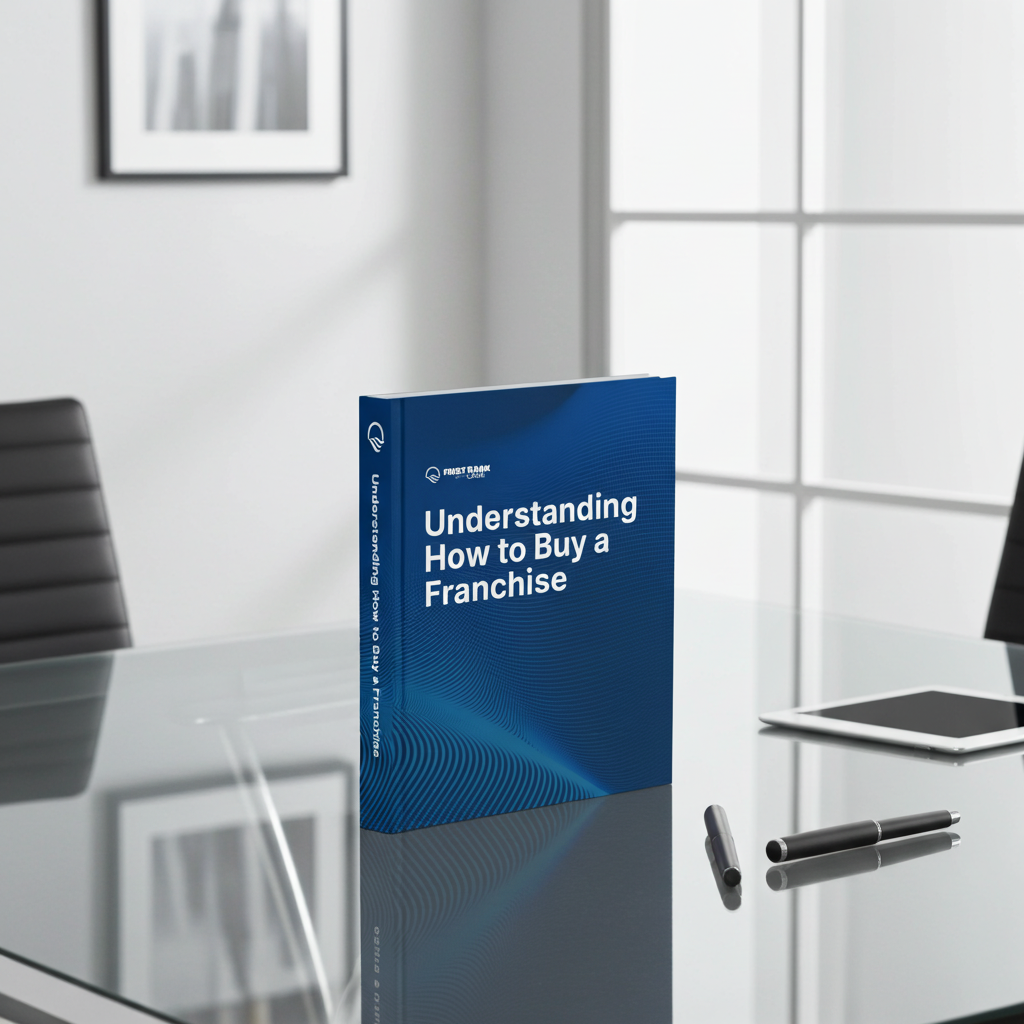
Common questions about buying and funding a franchise
A franchise is a business model where an individual (franchisee) purchases the rights to operate a location of an established company (franchisor). This means you invest in a proven system, using the brand's name, products, and business model in exchange for fees and royalties.
Key advantages of buying a franchise include:
- Proven Business Model: You get a concept that has already been tested and refined, eliminating much of the guesswork associated with starting a business from scratch.
- Built-In Brand Recognition: Franchises come with an established brand that customers already recognize and trust, leading to faster sales and instant credibility.
- Training and Support: Franchisors typically offer comprehensive training programs, marketing assistance, and operational guidance, providing a roadmap and experienced support team.
- Higher Success Rates: Statistically, franchises have a higher success rate than new independent businesses (over 90% survival in the first two years), as the proven framework and ongoing support reduce risk.
- Easier Financing: Lenders often view franchises as lower risk due to their proven track record, making it easier to secure funding, including specialized SBA loans.
The process of buying a franchise typically involves these key steps:
- Research and Choose: Identify franchises that align with your interests, skills, and budget by conducting self-assessment and exploring various industries.
- Franchisor Approval: Apply and secure the franchisor's approval to move forward.
- Due Diligence: Thoroughly review the Franchise Disclosure Document (FDD), which details every aspect of the franchise, and consider hiring a franchise attorney and accountant to assist.
- Arrange Financing: Secure the necessary funding, often through SBA loans (7(a) or 504) or conventional bank loans.
- Sign Agreement & Pay Fee: Once satisfied with the terms, sign the franchise agreement and pay the initial franchise fee.
- Training: Complete the franchisor's training program, which covers operational systems, marketing, and customer service.
- Site Setup: Work with the franchisor to select a site (if applicable), negotiate a lease, complete the build-out, and obtain necessary licenses and permits.
- Launch & Operate: Open your business, implement local marketing strategies, and continuously follow the established franchise system.
The cost to buy a franchise varies significantly based on the industry, brand recognition, and operational requirements. Costs can range from under $100,000 for low-cost, service-based mobile businesses to over $1 million for high-end operations like hotels or large fast-food chains. Many retail, fitness, or fast-casual food franchises fall within the $150,000 to $500,000 range.
Key expenses include:
- Franchise Fee: An upfront payment (typically $20,000 to $100,000+) to join the franchise system.
- Startup Costs: These encompass expenses for location build-out or renovation, equipment, initial inventory, licenses, and initial marketing. These can range from $100,000 to $500,000 or more, depending on the business type.
- Working Capital: A crucial cash reserve (experts recommend 3–6 months) to cover operating expenses like payroll, rent, and utilities until the business becomes self-sustaining.
- Ongoing Fees: Regular payments to the franchisor, typically including royalties (4% to 12% of sales) and often an advertising fund fee for national marketing.
- Personal Finances: Consideration for your personal living expenses, especially if you won't draw a salary from the business immediately.
The Franchise Disclosure Document (FDD) is a crucial legal document that franchisors are required by the U.S. Federal Trade Commission to provide to prospective franchisees. You must receive the FDD at least 14 days before signing any contract or paying any fees.
The FDD is often hundreds of pages long and contains 23 "Items" detailing virtually every aspect of the franchise, including:
- Franchisor's background, history, and leadership.
- Litigation history of the franchisor and its executives.
- All initial and ongoing fees required.
- Estimated initial investment and startup costs (Item 7).
- Restrictions on products, services, and supply sourcing.
- Franchisee and franchisor obligations and support.
- Financial performance representations (optional Item 19).
- Number of existing franchises, as well as closures and transfers.
- Actual franchise agreement and related contracts.
Reviewing the FDD thoroughly is paramount because it fully discloses what you are committing to, helps prevent costly surprises, and is designed to protect you by providing transparency into the opportunity and the franchisor's operations. It is highly recommended to consult a franchise attorney and an accountant to help interpret its legal and financial details.
Most franchise buyers do not pay the entire cost out-of-pocket and rely on financing. Common options include:
- SBA 7(a) Loans: This is one of the most popular options, offered by banks and guaranteed by the U.S. Small Business Administration (SBA). The government guarantee allows banks to offer lower down payments (often 10-20% equity injection) and longer repayment terms. These loans can provide up to $5 million for various business purposes, including franchise fees, equipment, and working capital. Franchises listed in the SBA Franchise Directory have a streamlined application process.
- SBA 504 Loans: Ideal for franchises requiring major real estate or construction (e.g., new restaurants or hotels). This loan type combines a bank loan with an SBA-backed CDC (Certified Development Company) loan, typically structured as 50% bank, 40% CDC, and 10% borrower equity. It offers long-term, fixed-rate financing for fixed asset purchases with lower down payments (10-15%).
- Conventional Bank Loans: Standard commercial loans from banks or credit unions are an option, especially for those with strong credit and ample collateral. However, they often require larger down payments and have shorter terms compared to SBA loans.
To apply for financing, you'll need a comprehensive business plan with financial projections, personal financial statements, tax returns, a copy of the FDD, and the franchise agreement. Lenders evaluate both the borrower's qualifications and the franchise's viability.
Franchise opportunities are available in nearly 300 industries, spanning a wide range of sectors. Some of the most popular and prominent franchise industries include:
- Fast Food and Restaurant: Chains like McDonald's, Taco Bell, or Culver's, often requiring substantial investment but offering high brand recognition.
- Fitness and Gym: Such as Planet Fitness, capitalizing on the expanding health and wellness sector, with significant upfront costs for equipment.
- Real Estate: Brokerage franchises like RE/MAX or Century 21, known for relatively low overhead and being accessible options.
- Childcare & Education: Daycare centers (Kiddie Academy) or tutoring services (Kumon), addressing the continuous demand from families.
- Retail Store: Convenience marts (7-Eleven) or specialty boutiques, leveraging established product lines and supply chains.
- Automotive Services: Oil change shops (Jiffy Lube), car repair centers (Meineke), or tire dealerships, meeting essential, recurring consumer needs.
- Home Services: Cleaning services, restoration (Servpro), lawn care, or plumbing, many of which can be mobile businesses with moderate initial costs.
- Professional & Business Services: Tax preparation (H&R Block), accounting, business coaching, or staffing agencies, often requiring only an office space.
- Pet Care: Grooming, supply retail, or dog daycare (Woof Gang Bakery & Grooming), driven by passionate pet owners.
- Senior Care: Non-medical home care services (Home Instead Senior Care), senior relocation, or fitness for the aging population, often with lower brick-and-mortar costs.
Narrowing down your franchise choices involves careful self-assessment and thorough due diligence:
- Self-Assessment: Start by evaluating your passions, experience, skills, and the role you envision for yourself. Choose an industry that genuinely interests you.
- Explore Industries: Research various franchise industries, considering local market demand and which ones are thriving or needed in your community. Utilize resources like the SBA Franchise Directory to identify approved brands.
- Research Opportunities: Use franchise directories (e.g., Franchise Direct) and attend franchise expositions to identify specific brands that match your investment level and goals. Pay attention to required investment, support offered, and territory availability.
- Talk to Existing Franchisees: This is a critical step. The FDD lists current owners' contact information. Speak with them to get an honest picture of day-to-day operations, earnings potential, and challenges. Ask if they would invest again.
- Market Demand and Competition: Evaluate how the franchise would perform in your specific local market. Assess demand for the product/service and analyze existing competitors.
- Review the FDD in Depth: After expressing serious interest, carefully review the Franchise Disclosure Document. Pay close attention to fees, investment costs, litigation history, franchisor and franchisee obligations, and financial performance representations.
- Consult Professionals: Hire a franchise attorney to interpret legal aspects of the FDD and the franchise agreement, and an accountant to analyze financial statements and earnings projections.
- Attend Discovery Day: If invited, participate in the franchisor's Discovery Day to meet the corporate team, observe operations, and ask important questions about support, challenges, and the franchisor's vision.
The time it takes for a franchise to reach break-even and start turning a profit can vary significantly. For low-cost, home-based businesses, it might be a few months. For capital-intensive operations like restaurants or gyms, it could take a year or more.
Profitability timing depends on several factors:
- Industry: Some industries naturally have faster revenue generation cycles than others.
- Location: The market demand, competition, and customer traffic at your specific location play a crucial role.
- Expenses: High initial startup costs and ongoing operational expenses will prolong the break-even period.
- Customer Growth: The speed at which you can attract and retain a customer base is a primary driver of profitability.
- Management: Effective management, adherence to the franchisor's proven system, and strong local marketing efforts can accelerate profitability.
It's essential to review Item 19 of the FDD (Financial Performance Representations), if provided, for any earnings claims or average franchisee performance data. Additionally, creating your own detailed financial projections and cash flow models, with ample working capital, will help set realistic goals for achieving profitability.
All loans are subject to credit approval. Restrictions and limitations may apply. First Bank of the Lake does not provide tax, legal or investment advice. All decisions concerning these matters should be made in conjunction with your professional advisors.•
*Top 1% of SBA 7(a) lenders by approval amount during SBA fiscal year 2023. Top 5 SBA franchise lender by approval count during SBA fiscal years 2024 and 2023.
Approved to offer SBA loan products under SBA's Preferred lenders Program.



